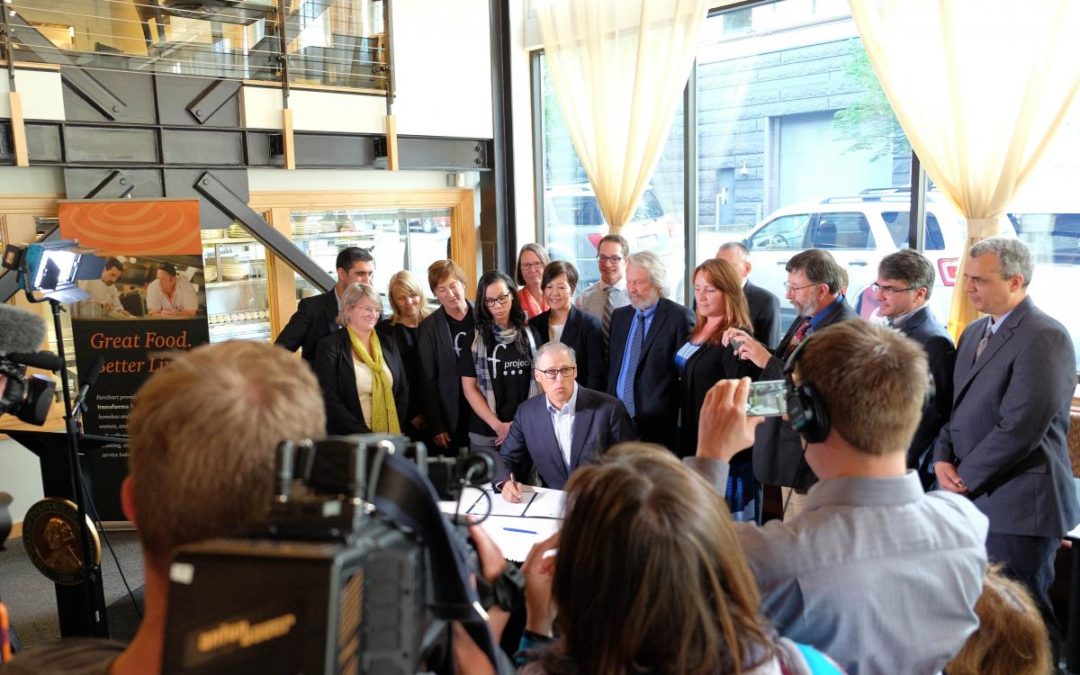As part of the first annual U.S. Department of Justice’s NATIONAL REENTRY WEEK (April 24-April 30, 2016), states and localities across the country are joining the Federal Government in acknowledging the necessity for more comprehensive reentry support that yields real, lasting, humane results. Columbia Legal Services is excited to join this vital conversation around reentry and what it really means (or more accurately, DOESN’T mean) to have a criminal record in America.
POLICY PROGRESS
For years, Columbia Legal Services (CLS) and our partners have lead efforts around achieving successful reentry policies in Washington State. Together, we’ve had some major successes in the legislature this year, a few of which are highlighted here:
SESHB 1553 – Certificates of Restoration of Opportunity (CROP)
Before the CROP bill passed, there were over 90 professions and occupations that were automatically off limits to people with criminal records, no matter how much time had passed since the conviction or how hard that person had worked toward something better. Now a process has been created by which many of those jobs can be pursued again. This benefits the community by improving job access to the hardworking people most in need of stability, and also employers by increasing the prospective, qualified employee pool. CROP was introduced in 2013 by Rep. Brady Walkinshaw (D-Seattle), and we have worked with him over the last three years to build community and legislative support. CROP was championed by a broad coalition of organizations from across Washington State, including Washington Association of Prosecuting Attorneys, Rental Housing Association, Washington Superior Court Judges Association, Partners for Our Children, Greater Seattle Business Association, Union Gospel Mission, and others. We are grateful that the state legislature unanimously agreed on the practical and moral imperativeness of the right to earn a second chance.
SSB 6430 – Medicaid Suspension
In this case the suspension of Medicaid is a good thing… a VERY good thing. It used to be that upon incarceration, a person receiving Medicaid benefits would be terminated from the system. Although jails and prisons offer some health care internally, people would be released into the community with no coverage at all. The sad reality is that in these institutions a person’s health often deteriorates, meaning they have more health care needs when they leave, but that care is harder to access. In the time it takes to find housing, find employment, and re-secure Medicaid or other health care, people can suffer debilitating mental and health care crises that should have been prevented.
The Medicaid Suspension bill will do just that, by suspending rather than terminating a person’s Medicaid benefits during incarceration and developing a process by which those benefits can be accessed immediately upon release. Asking low-income people to prioritize health or home is a false choice, in that you simply can’t pursue one without the other. Many now won’t have to make this unnecessary choice.
Governor’s Executive Order 16-05
This one comes straight from the top. On April 26, 2016, at FareStart in Seattle, Governor Jay Inslee signed an executive order (pictured above) directing ten state agencies to take deliberate and specific actions facilitating the pursuit and achievement of employment by people with criminal records. He said that the reentry process should start immediately upon incarceration and continue through release into the community. Governor Inslee and his administration are setting the example for public and private employers across the state, and amplifying the message that work for everyone is good for everyone.
ONGOING REENTRY SERVICES
CLS and our partners offer an array of reentry support services. If you don’t see what you need below, you can contact the CLEAR Hotline by dialing 2-1-1 for a legal or social service referral specific to your situation.
Open Door Legal Services at the Union Gospel Mission
Their work centers around reducing barriers to financial and social stability, focusing on issues like:
- Child support and visitation
- Criminal warrants
- Debts
- Court fines and re-licensing
To contact Open Door Legal Services use the link above, or contact David at 206-682-4642.
Neighborhood Legal Clinics (NLC) at the King County Bar Association
NLC provides free 30 minute consultations with an attorney at 34 locations across King County. They can help by:
- Providing legal advice for civil legal issues
- Helping answer papers, summons, and requests
- Providing referrals and resource information
They offer assistance in a range of civil legal issues. To make an appointment at the clinic closest to you, use the link above or call 206-267-7070 Tuesday-Thursday from 9:00am-12:00pm.
THESE PROGRAMS ARE NO LONGER AVAILABLE
CLS Reentry Legal Clinic
Columbia Legal Services previously offered a free legal clinic for low-income people with criminal records in Washington State. If you owed legal financial obligations (LFOs) from misdemeanor or felony convictions in a municipal, district, or superior court in Washington State we may have been able to help you reduce your debt or manage your payments to avoid further penalties.
Second Chances Project at the ACLU of Washington
Their work previously provided direct legal services to individuals who wanted to reduce the barriers posed by criminal records or had questions about clearing criminal records. They also provided resources and community education on criminal records issues.

Recent Comments